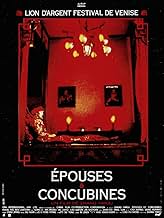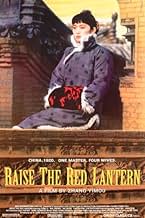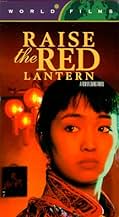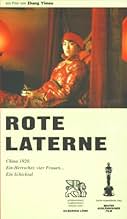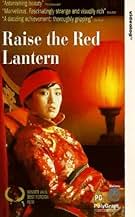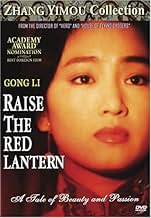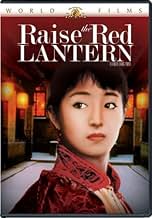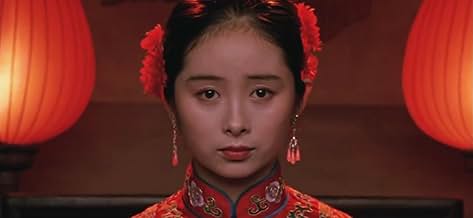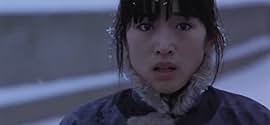IMDb रेटिंग
8.1/10
37 हज़ार
आपकी रेटिंग
एक जवान औरत एक अमीर प्रभु की चौथी पत्नी बन जाती है, और उसे घर के भीतर सख्त नियमों और तनावों के साथ रहना सीखना चाहिए।एक जवान औरत एक अमीर प्रभु की चौथी पत्नी बन जाती है, और उसे घर के भीतर सख्त नियमों और तनावों के साथ रहना सीखना चाहिए।एक जवान औरत एक अमीर प्रभु की चौथी पत्नी बन जाती है, और उसे घर के भीतर सख्त नियमों और तनावों के साथ रहना सीखना चाहिए।
- 1 ऑस्कर के लिए नामांकित
- 23 जीत और कुल 15 नामांकन
Zengyin Cao
- Old Servant
- (as Zhengyin Cao)
Zhigang Cui
- Dr. Gao
- (as Zhihgang Cui)
Espérance Pham Thai Lan
- Kids - Concubines
- (बिना क्रेडिट के)
फ़ीचर्ड समीक्षाएं
I can certainly understand why this film is so critically acclaimed. Raise The Red Lantern is one of the only Chinese movies I've seen, but I'll definitely admit that it's unusual to see a film this stylistically masterful come out of Hollywood (although it can happen -- The Thin Red Line, for example). A lot of what makes this film work is Zhang Yimou's outstanding directorial style; his use of color against bleak background is especially effective. It's his hypnotic visuals that keep you interested throughout the slow progression of the story. And the amazing acting by most of the performers doesn't hurt, either; everything feels completely real.
I think of this as one of those movies that you aren't supposed to enjoy; it shocks you, and leaves you just as disturbed as, considering the subject matter, you should be. The miserable story of Yan'er, the servant girl, is especially painful to watch, and the same goes for the unfolding of the last few scenes. But I think the fact that I was so unsettled by this movie probably just goes to show how well it gets its points across. And along with the remarkable acting and directing, that's definitely something to be respected.
I think of this as one of those movies that you aren't supposed to enjoy; it shocks you, and leaves you just as disturbed as, considering the subject matter, you should be. The miserable story of Yan'er, the servant girl, is especially painful to watch, and the same goes for the unfolding of the last few scenes. But I think the fact that I was so unsettled by this movie probably just goes to show how well it gets its points across. And along with the remarkable acting and directing, that's definitely something to be respected.
This movie has it all, betrayal, conflict and tragedy. I have to say that I couldn't live without it, effectively anyway. The political criticisms tear at the spine of the film and the beauty of it in such an intimate setting is outstanding. The use of such a rich, three dimensional setting defies what we have been taught by the mainstream as being beautiful and sets a standard on a budget that I would love to be aware of, that all Hollywood movies should aspire to. It shows us that film, real film that is, does not need $100 million to look good, rather the combination of a haunting setting in the middle of vastness and the equally haunting beauty of it's star, Gong Li, but at it's heart the house itself resembles a claustrophobic pot, boiling over the surface.
This is in my opinion, Zhang Yimou's greatest film, it is a triumph in film form and narrative. The haunting sounds of flutes, a significant visual and audio element that has a mythical quality due to it's importance to Songlian and becomes an unattainable item of the gods when it is removed from existence when it is burned, becoming a tragic reminder on the attempts to vanquish the personalities of not only Songlian but all of the concubines. It's slow burning nature may repel the masses but anyone who can get a copy, do so without fail, you will never regret it. I cannot stress the importance of this film, we may see it as a study on the oppression of women in China, but this is universal, we westerners once did the same thing not too long ago.
For me the cinematography is what sells the film, it is the best I have ever seen and ever will. If there is ever a film to promote the use of the three strip technicolour process once again, this is it. Long after you have finished your post film analysis, the light from the red lanterns will still be searing in your eyes.
This is in my opinion, Zhang Yimou's greatest film, it is a triumph in film form and narrative. The haunting sounds of flutes, a significant visual and audio element that has a mythical quality due to it's importance to Songlian and becomes an unattainable item of the gods when it is removed from existence when it is burned, becoming a tragic reminder on the attempts to vanquish the personalities of not only Songlian but all of the concubines. It's slow burning nature may repel the masses but anyone who can get a copy, do so without fail, you will never regret it. I cannot stress the importance of this film, we may see it as a study on the oppression of women in China, but this is universal, we westerners once did the same thing not too long ago.
For me the cinematography is what sells the film, it is the best I have ever seen and ever will. If there is ever a film to promote the use of the three strip technicolour process once again, this is it. Long after you have finished your post film analysis, the light from the red lanterns will still be searing in your eyes.
We Americans are accustomed to our fast moving world and our equally fast paced movies but the older countries of the world have something very valuable to offer in cinema, if we can take some time, literally, to consider it. This movie brings that mature stateliness of the old world before our eyes in almost an indelible way.
Moving in a very slow and artfully calculated rhythm, one scene slides into another, each setting a perfect little painting that can almost distract the attention away from the action and the dialog. The story develops gradually, starting out as a situation that is completely unfamiliar to the viewer and progressing stepwise through increasingly familiar emotional territory until even the 21st century American knows exactly where things stand.
The story is absorbing and the comment on Chinese society is important in today's world, but the main interest for me is the mood of meditative quietude and the rather dreamlike atmosphere that is generated continually, until it saturates right through.
Moving in a very slow and artfully calculated rhythm, one scene slides into another, each setting a perfect little painting that can almost distract the attention away from the action and the dialog. The story develops gradually, starting out as a situation that is completely unfamiliar to the viewer and progressing stepwise through increasingly familiar emotional territory until even the 21st century American knows exactly where things stand.
The story is absorbing and the comment on Chinese society is important in today's world, but the main interest for me is the mood of meditative quietude and the rather dreamlike atmosphere that is generated continually, until it saturates right through.
10Deidra
In response to the comments that this film is boring, shallow or without a character to identify with: Please study some Chinese history before you make such judgments. The story we see is a visual treat but overlays a much deeper story of China in myriad aspects. Perhaps you are unaware that films and books of the period had to tread lightly on topics that were not merely taboo but could result in danger for all connected. Thus, a slight symbolic representation often took place. Sort of poetic shorthand. Not unlike Chinese art that may seem to be about the season of autumn but is actually about death or change or loss. Nevertheless, any film must stand on its own regardless of the background. This film includes acting scenes that are incredibly forceful and still so gentle. The photography, costumes, sound and music blend into a cinematic work of art. I found the character completely believable, a woman bound in a tradition from which she found no escape except death or madness. And for those who sneer at the opera singer, imagine how the music you enjoy would sound to someone who has a completely different background. Please accept cultural diversity and let your mind and heart be enlarged!
Zhang Yimou solidifies his standing as one of cinema's most brilliant craftsmen with Raise the Red Lantern, a heartbreaking and fascinating look into the life of a young, well-educated woman who gives up her future to become the fourth wife of a wealthy landowner in 1920s China. Gong Li, the director's longtime muse, delivers a performance nearly unsurpassed by anyone, male or female, in the 1990s (and many other decades, as well). Her opening close-up is an indelible image of sorrow and resignation capable of drawing tears out of a statue. Zhang Yimou makes films as exquisitely composed as any master's painting, and his palette extends beyond the obvious beauty of Gong Li to include the details of the courtyards, lanterns, silks, and rooftops with an inexplicable mixture of tranquility and austerity.
क्या आपको पता है
- ट्रिवियाFilmed at the Qiao Family Compound near the city of Pingyao. The complex is now open for tours, however, nowhere is there any mention of the film.
- गूफ़Around 01:18:59, there is a lot of smoke in front of the third wife. And there is almost no smoke in front of the second one.
- भाव
The Third Concubine: Good or bad, it's all playacting. If you act well, you can fool other people; if you do it badly, you can only fool yourself, and when you can't even fool yourself, you just can fool the ghosts.
टॉप पसंद
रेटिंग देने के लिए साइन-इन करें और वैयक्तिकृत सुझावों के लिए वॉचलिस्ट करें
- How long is Raise the Red Lantern?Alexa द्वारा संचालित
विवरण
बॉक्स ऑफ़िस
- US और कनाडा में सकल
- $26,03,061
- US और कनाडा में पहले सप्ताह में कुल कमाई
- $22,554
- 15 मार्च 1992
- दुनिया भर में सकल
- $26,03,061
- चलने की अवधि2 घंटे 5 मिनट
- रंग
- पक्ष अनुपात
- 1.85 : 1
इस पेज में योगदान दें
किसी बदलाव का सुझाव दें या अनुपलब्ध कॉन्टेंट जोड़ें

टॉप गैप
By what name was Da hong denglong gaogao gua (1991) officially released in Canada in French?
जवाब

